Information from the article that got me thinking:
Through reading the article provided by this weeks topic, I am learning the importance of thinking critically when searching for information online. When searching for information, it is important to not just look at the first thing that comes up as the answer. But delve deeper to determine the validity of the site(s). When assessing credibility of sources, here are some things to consider, based on Rheingold’s (2012) article:
- Who is the author?
- What are the authors sources – triangulate by checking three different credible sources
- Popularity of site
- Professional reputation/offline reputation
- Previous experiences with the site
- Proof of neutral affiliation
- Tone of the writing
- Elements of style used
Our ‘infotention’ is often pulled in a variety of directions. It’s important, as a generation that is online for a large portion of their daily lives, to manage their attention on information. And to make sure that the information that they are paying attention to is easily accessible and accurate.
The filter bubble – search engines use precise information about your interests and search history to customize your searches (e.g. liberal vs. conservative viewpoints on current event articles). This is something that I vaguely knew about, but have not paid too much attention to.
How do digital filter bubbles affect the information that we consume about the Global Covid-19 pandemic?
During this time of uncertainty and almost constant stream of information, I am realizing that the information that I am being fed has already been predetermined for me. Ben, one of my Masters course classmates, posted a screenshot of the results when he searched ‘Coronavirus’ using a Google search engine. Cheryl then posted hers and it was so interesting to see there was a difference. My sister and I then just did the same thing and I was amazed to see the difference.
Ben’s Screen
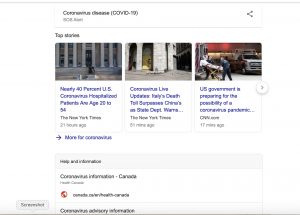
Cheryl’s Screen (same day but later)
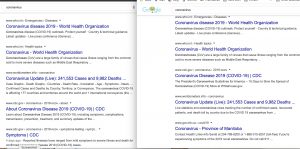
My Screen (a few days later)
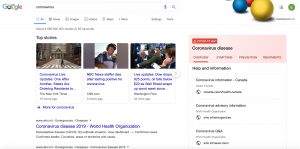
My Sisters Screen (on the same day as me)
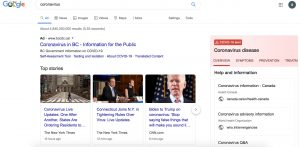
Doing this little experiment really showed me how little I know about the information I am consuming and how it is pre-directed to me. As this crisis evolves, I look forward to searching out my own information using the suggestions from the article above.
Reflection Questions:
How can our digital bubble as educators filter the stories we hear and believe?
It depends on how we are engaging with the digital world. Most educators now a-days are using platforms such as Twitter to engage with teachers around the world and get inspiration from other teachers around them. However, the information that they are receiving is only determined by who they are following and who those people are following. It is important to build the collection of who you follow around what you value and want to see on a day to day basis.
Digital platforms such as Twitter can be a great place to connect people and collect inspiration from others. However, it can also be a place where people share their personal opinions and views that do not necessarily align with yours. During particularly difficult times (e.g. pandemics, global tragedies, political unrest, union negotiating) it can become a particularly negative place (depending on who you are following).
What kinds of digital tools expand filter bubbles in your learning context?
- Variety of search engines/resources – allows for me to collect a variety of information on a topic of interest
- Twitter – help me engage with teachers around the world
- Instagram – helps me engage with teachers around the world (I have a personal private account where I can limit what I see and a public teaching account where I am open to seeing and sharing more information)
- Facebook – help provide ideas and learning prompts for structured play opportunities
- Conversation with people – help to provide opportunities and information that I have not heard through my usual searches
What are you doing to ensure students are using a wide variety of digital resources ?
In my context, I have conversations with students about digital resources and reliable information. In term two, I looked up some information about Canadian provinces and territories with my Grade 2’s. Together we looked at sites and their authors to determine which would be good sources.
“Every (wo)man should have a built-in automatic crap detector operating inside him (them).” —Ernest Hemingway, 1965
References:
Rheingold, H. (2012). Chapter 2 Crap Detection 101: How to Find What you Need to Know, and Decide if It’s True. In Net Smart: How to Thrive Online. (pp. 77-111). Cambridge, Mass. MIT Press.
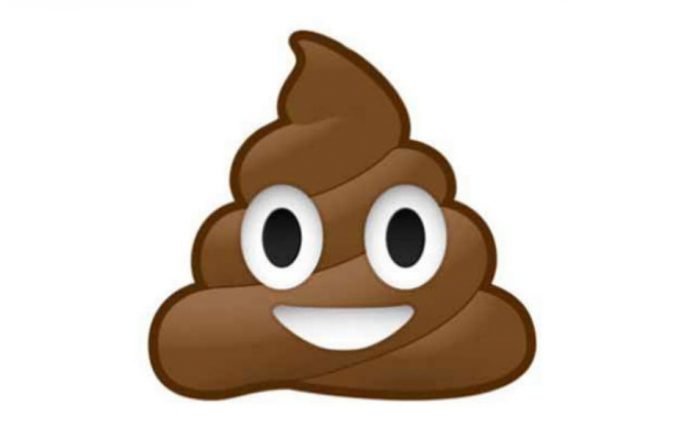
Recent Comments